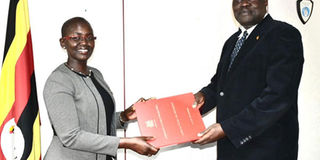DPP right in weeding out unworthy cases

Recently, Dr Stella Nyanzi, a former Makerere University research fellow, was arrested while demonstrating over the slow distribution of Covid-19 relief food, but she was never arraigned before the courts of law as it has been the norm.
Reason: the Director of Public Prosecutions, Justice Jane Frances Abodo, thought otherwise. The charge of being a nuisance slapped against Dr Nyanzi by the police was at the time not among the deserving cases that her office was taking seriously.
Weeding out cases that have taken long in the justice system (more than three years) and not sanctioning undeserving cases is the strategy that the new chief government prosecutor is pursuing.
Legal pundits have previously expressed their dissatisfaction with the Office of the DPP for not withdrawing cases where they have not had a head-way for a long time. An often cited case is that of treason slapped against Opposition activist Kizza Besigye, which has been in the system for the last five years without being sent to the High Court for trial.
The new strategy is welcome as it will go a long way in freeing the clogged justice system. Some of these undeserving cases are politically motivated, some being very petty and should have been resolved at the Local Council level.
The 2015 National Court Case Census report revealed that there were a whopping 114,809 cases in the justice system that had not been disposed of, with one in every four pending for more than a decade.
We are optimistic that the new strategy will also ensure that the few available state prosecutors will direct their productive energies to prosecuting serious cases that, among others, include going after the elusive corrupt government officials.
This is because the statistics from the Office of the DPP indicate that there are only 336 prosecutors and yet the approved structure should have 833.
The strategy that Uganda’s first female chief government prosecutor is exploring gives us hope that this noble office will prosecute only deserving criminal cases and also not be used by the Executive to fight its wars against the Opposition.
This is because Justice Abodo’s predecessors have been accused of being used by the Executive to slap flimsy charges against critical voices and the same cases never make headway, and only clog the justice system.
Our view is that going forward the office bearer of this key government institution should follow the Constitution. The Constitution demands that the DPP makes prosecutorial decisions on a professional basis that is independent of political influence or control.




